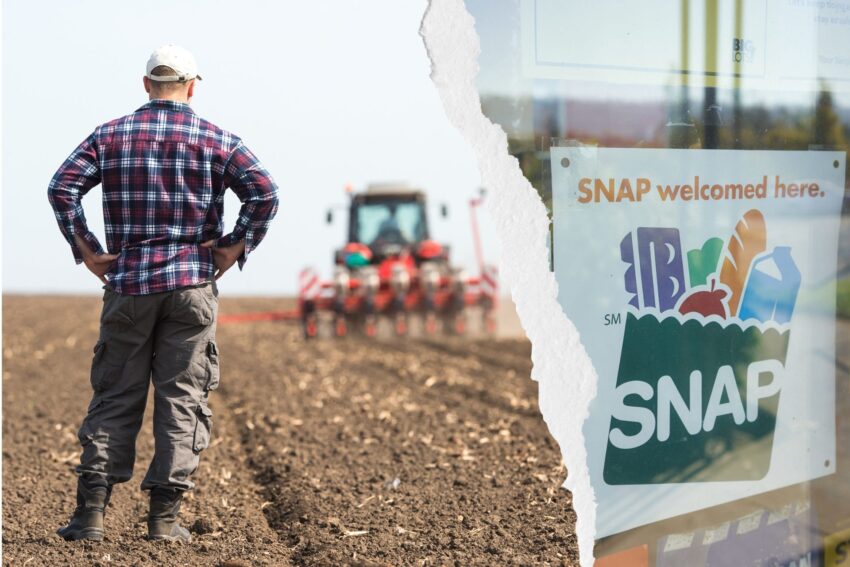The Farm Bill, a legislative package that comes up for renewal roughly every five years, has long been a battleground for policy debates, particularly concerning the Supplemental Nutrition Assistance Program (SNAP), formerly known as food stamps. While SNAP constitutes a significant portion of the Farm Bill’s budget, there’s a growing sentiment among farmers and agricultural advocates that this program should not be intertwined with agricultural policy. Here’s why, from a pro-farmer perspective, SNAP benefits should be considered separately from the Farm Bill.
The Disparity in Focus
The Farm Bill is intended to address agricultural policy, rural development, and the direct support of farming operations. However, the inclusion of SNAP, which accounts for about 80% of the Farm Bill’s funding, shifts the legislative focus away from these core agricultural issues. Farmers argue that this imbalance leads to policy decisions that might not directly benefit or even understand the needs of the agricultural sector. For instance, debates over SNAP often overshadow discussions on crop insurance, conservation, or rural infrastructure, which are critical for farmers’ livelihoods.
Political Leverage and Funding Dynamics
The debate over the Farm Bill often centers around SNAP funding, with Democrats always opposed to any cuts.
🚨The Republican's partisan #FarmBill text would make the largest cut to SNAP in nearly 30 years.🚨
Weakening our ability to feed the most vulnerable members of our communities is shortsighted and wrong.
Read Ranking Member @RepDavidScott's statement: https://t.co/0jtV6gr3Oe
— House Agriculture Committee Democrats (@HouseAgDems) May 17, 2024
The linkage of SNAP with farm subsidies creates a scenario where agricultural funding becomes a bargaining chip in broader welfare debates. This dynamic often results in agricultural programs being underfunded or overlooked in favor of SNAP, which, while crucial for addressing food insecurity, does not directly support farm operations or innovations. Farmers feel that this connection leads to a political environment where agricultural policy is held hostage to welfare policy, potentially leading to cuts or conditions in farm support as a means to balance the budget or appease political factions not concerned with farming issues.
Efficiency in Legislation
From an efficiency standpoint, separating SNAP from the Farm Bill could streamline the legislative process. Currently, the Farm Bill’s complexity, due to its dual focus, often leads to delays, compromises, and sometimes, failure to pass on time. This is what we are currently seeing, with the Farm Bill not likely to be passed this session.
SNAP benefits a sticking point that is holding up the new Farm Bill https://t.co/DJRYjeZWaC via @thecentersquare
— Neil Johnson (@thetaxdude) September 3, 2024
A standalone SNAP bill could be debated on its own merits, allowing for more focused discussions on how best to support those in need without diluting the attention on agricultural policy. At the same time, a Farm Bill centered solely on agriculture could lead to more targeted, effective policies that directly address the challenges faced by farmers, like market volatility, trade issues, and sustainable farming practices.
Economic and Social Considerations
Farmers also point out that SNAP, while beneficial for rural economies by providing a market for their produce, does not directly address the economic disparities within farming communities. The argument here is not against SNAP but against its integration into a bill that should primarily serve agricultural interests. By separating these concerns, lawmakers could craft policies that more effectively tackle rural poverty, food insecurity, and agricultural sustainability without one overshadowing the other.
Conclusion
The call to separate SNAP from the Farm Bill isn’t just about financial allocation but about policy focus, efficiency, and ensuring that agricultural legislation serves its intended purpose: supporting America’s farmers.
More than 80% of funding in the Farm Bill goes to SNAP, a highly abused welfare program.
Funding for agriculture ought to be separate from funding for food stamps.
Hardworking American farmers deserve better.
— Rep Andy Biggs (@RepAndyBiggsAZ) May 7, 2024
While SNAP plays a vital role in societal welfare, its integration into the Farm Bill has created a legislative imbalance that doesn’t serve the agricultural community’s best interests. By advocating for a division of these programs, farmers are not only seeking better support for their industry but also a more coherent, effective legislative approach to both agriculture and nutrition assistance. This separation could lead to a more robust Farm Bill that genuinely nurtures the backbone of America’s food production while allowing SNAP to be debated and funded on its own merits, ensuring it continues to serve those in need without compromising agricultural policy.


